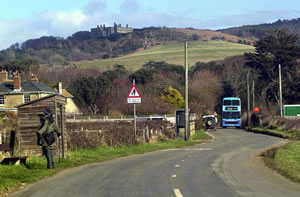| Back |
Background to the Procurement Progress
The signing of the contract on the 26 September 2012 marked the completion of the procurement process.
Our Project Background
In 2008, the Isle of Wight Council learned that it was one of only three areas in the country to qualify for funding under the first wave of pathfinder Highways Private Finance Initiative (PFI). The Island's road network is the first, largely rural road network, with non-standard vehicle growth patterns, to use this delivery methodology. We, therefore, have considerable opportunity to explore solutions that are best suited to the Island's needs, rather than simply following what is being done elsewhere.
The Isle of Wight Council Highways PFI Project encompasses all aspects of the highway that from fence to fence - this includes the road surface, drainage, street lighting, kerbs, footways, grass verges, signs, bus shelters, etc. The contract is likely to last for 25 years, starting in April 2013. It will include the Island's entire adopted road network, encompassing the management and maintenance of over 800kms of highway, 11.935 street lighting columns and a further 2,000+ illuminated street furniture items.
Our roads have suffered from years of limited expenditure and maintenance and are no longer fit for purpose - a number of roads have weight and/or width restrictions - and a high percentage of our street lighting columns are over 30 years old and need replacement. Therefore, after historic underinvestment, the Island's entire road network is to benefit from investment worth around £0.8bn (after inflation) over the 25-year life of the scheme.
The project is seen not only as a unique opportunity to revitalise the Island's transport infrastructure, but also to open up as many markets for local labour and suppliers as possible. Creating apprenticeship work placements is one possibility being explored by the council as it works to develop the scheme. We will also be working with the local Chamber of Commerce and Industry to support local businesses to reap their share of the rewards from such massive - indeed unprecedented - infrastructure investment.
Without this major investment in our roads the regeneration of the Island as a whole is in peril. The Project will not only change the face of the Island's road network, but be a major catalyst to the Island's redevelopment through the Eco Island themes of thriving island; healthy and supportive island; safe and well-kept island; inspiring island.
The Isle of Wight Council Highways PFI Project is a major Highways improvement and maintenance project that will encompass all aspects of the highway including the road surface, footways, drainage, street lighting, traffic signals, kerbs, grass verges, signs and bus shelters.
Due to start in April 2013 and with a value over its lifetime of around £0.8 billion, the 25-year contract will be the largest procurement that the Isle of Wight Council is ever likely to enter in to.
An illustration of recent expenditure on this procurement project can be found on the following Procurement Progress Report.
This far reaching project will offer unique opportunities to transform the Island’s roads, which have suffered from years of limited expenditure and maintenance. It will also be the largest engineering project ever undertaken on the Island bringing with it massive regeneration opportunities and possibilities for local businesses, suppliers, labour and the general economy.
Procurement process
 The procurement process the council has followed in appointing the best project partner is set
by EU Directives and in order to do this correctly, the council has followed an intensive, two and-
a-half-year-long procurement process. The council’s Highways PFI Project team has used its own
legal technical, financial and procurement expertise to undertake this complex process.
The procurement process the council has followed in appointing the best project partner is set
by EU Directives and in order to do this correctly, the council has followed an intensive, two and-
a-half-year-long procurement process. The council’s Highways PFI Project team has used its own
legal technical, financial and procurement expertise to undertake this complex process.
Before beginning direct negotiations with prospective service providers (bidders) the council advertised its intention to undertake a procurement process, by posting a notice in the Official Journal of the European Union (OJEU). All organisations that subsequently submitted a detailed application to be included in the council’s procurement process were evaluated on the technical, legal and financial merits of their application. Successful bidders were then invited to participate in the procurement process.
The procurement process that had to be followed is known as ‘Competitive Dialogue’. It is a structured process which allows the council to undertake a series of negotiations over time with bidders. These negotiations are known as ‘Dialogues’ and each Dialogue period ends with bidders submitting proposals for the council to consider and evaluate. This process led to the refinement of initial proposals (Outline Solutions) into Detailed Solutions and finally Refined Solutions, which should have matched the Island’s requirements. The Dialogue periods were very detailed negotiations which looked at all aspects of the project, from solutions for long standing major geotechnical issues, through to details of kerbstones and grass cutting. The range of skills and experience required to negotiate effectively on this broad range of topics meant the council sometimes had to use leading specialists and expert advisors to be sure of obtaining the best solutions and protecting the Island’s long term interests.
Key procurement milestones were as follows:
|
March 2010 June 2010 September 2010 May 2011 December 2011 March 2012 May 2012 September 2012 1 April 2013 |
Pre-requisites for a successful procurement process
 A 25-year contract dealing with over 800km of roads including kerbs, footways,
carriageways, CCTV, lighting, bridges and challenging geological features needs to be
carefully structured. It requires all assets to be listed, the current condition for each asset
defined and future condition requirements for each of these to be set out. The contract must anticipate and
account for all future changes that may need to be built in to the agreement. It must also
take into account the impacts of events such as flooding or erosion as well as agreeing how
the partner will be paid according to its performance.
A 25-year contract dealing with over 800km of roads including kerbs, footways,
carriageways, CCTV, lighting, bridges and challenging geological features needs to be
carefully structured. It requires all assets to be listed, the current condition for each asset
defined and future condition requirements for each of these to be set out. The contract must anticipate and
account for all future changes that may need to be built in to the agreement. It must also
take into account the impacts of events such as flooding or erosion as well as agreeing how
the partner will be paid according to its performance.
The contract will identify and develop approaches to dealing with third parties such as the utility companies and travel operators and – crucially address how traffic flows will be maintained during construction work. This is particularly important on a tourist island.
As all these issues need to be addressed in one watertight contract, designed to get the best possible scheme in the long-term interest of the Island, the level of expertise required to assemble such a complex contract does not reside within one organisation, team or person. To manage the procurement of the Highways PFI project, the council has constructed a small project team of specialists including technical, financial and legal experts with a broad range of skills within their fields.
However, the successful management of the procurement process also means it is sometimes necessary to acquire supporting expertise from outside of the council.
The service of these expert advisors ensures the resources of leading experts are used to help the council achieve its objectives. This advice typically can push bidders to innovate and ultimately reduce costs. The negotiation team representing the Island is therefore a blend of local expertise and proven specialist advisors. In order to cost effectively assemble the necessary expert advisors and international bidders, most Dialogue sessions are located on the mainland.
The principal selected expert advisors include:
Price Waterhouse Coopers
Leading PFI/PPP advisor in the UK and internationally, being lead financial advisor on over 150 PPP Projects that have achieved financial close around the world (as at July 2008).
A major project ultimately valued at around £0.8bn requires complex financial modelling to ensure all eventualities are planned for and the Island gains best value for money.
PWC’s main tasks so far have included assisting with the financial modelling to establish the cost of the PFI, the level of credits required and the resultant affordability position of the Authority. They also provide key assistance in understanding the procurement and contract risks associated with the Highways PFI Project and, where appropriate, quantifying these for the purposes of the risk analysis to be included in the Business Case. Additionally, they offer support on commercial, financial, bid evaluation and procurement issues requested of them including providing advice in terms of the latest positions given the current funding climate.
WSP
A global design engineering and management consultancy specialising in Transport & Infrastructure, Property, Industry and Environment projects.
WSP provide design, engineering and management consultancy services across the full spectrum of these disciplines, by applying their multidisciplinary approach, and offer integrated project teams to both local and global clients.
They deliver public sector facilities to central and local authorities and government agencies around the world. Their portfolio ranges from infrastructure assets and prisons to regeneration and road projects. They are recognised global leaders in transport modelling, and provide strategic advice to major government transport agencies. They offer significant expertise in complex PPP/PFI programmes in the road, education, health and defence sectors.
DLA Piper
The commission with DLA Piper LLP expired at the end of their contract period in September 2011 and following a procurement exercise for legal advisors in the autumn of 2011, Burges Salmon LLP were appointed.
Burges Salmon
Burges Salmon have significant experience in a number of major Highways and street lighting projects, including Design, Build, Finance and Operate contracts, in particular, advising funders on the Birmingham Highways PFI project. Of particular value is Burges Salmon’s experience of closing deals in the Highways sector. Burges Salmon is involved in the evaluation of legal submissions and once the project reaches Financial Close will be involved in producing a guide to the project documents for the Authority’s internal contract management team.
WDM
WDM Limited have 40 years experience in undertaking highway condition surveys and providing asset management consultancy and software to highway authorities throughout the UK. WDM offers the complete asset management solution supported by unrivalled experience and technical expertise. They are the UK’s leading manufacturer and provider of highway survey and monitoring equipment, with a unique understanding of highway maintenance and asset management, they are also the UK’s largest survey contractor, serving all UK Government agencies and 90% of local authorities. They continue to develop pavement monitoring technology, set new industry standards and help clients and partners, both in the UK and overseas, achieve new levels of best practice.
The Pavement Management System module provides a complete solution to pavement maintenance from input and processing of raw survey data through to treatment selection, budgeting and repair history.





